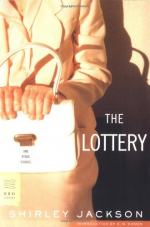|
This section contains 2,196 words (approx. 8 pages at 300 words per page) |

|
SOURCE: "Shirley Jackson: 'The Lottery,'" in Understanding Fiction, edited by Cleanth Brooks and Robert Penn Warren, second edition, Appleton-Century-Crofts, 1959, pp. 72-6.
Brooks was one of the most influential of the "New Critics"; he espoused a critical method characterized by a close reading of texts in which an individual work is evaluated solely on the basis of its internal components. Warren was the Pulitzer Prize-winning author of All the King's Men (1947), Promises: Poems, 1954–1956 (1957), and Now and Then: Poems, 1976–1978 (1979). In the following essay, they examine Jackson's intentions in "The Lottery," contending that it is meant to be a parable whose "fictional form actually gives point and definition to social commentary."
The plot [of Shirley Jackson's "The Lottery"] is so simple that to some readers it may seem to lack sufficient complication to be interesting. The story seems to do no more than recount the drawing of lots to determine...
|
This section contains 2,196 words (approx. 8 pages at 300 words per page) |

|


